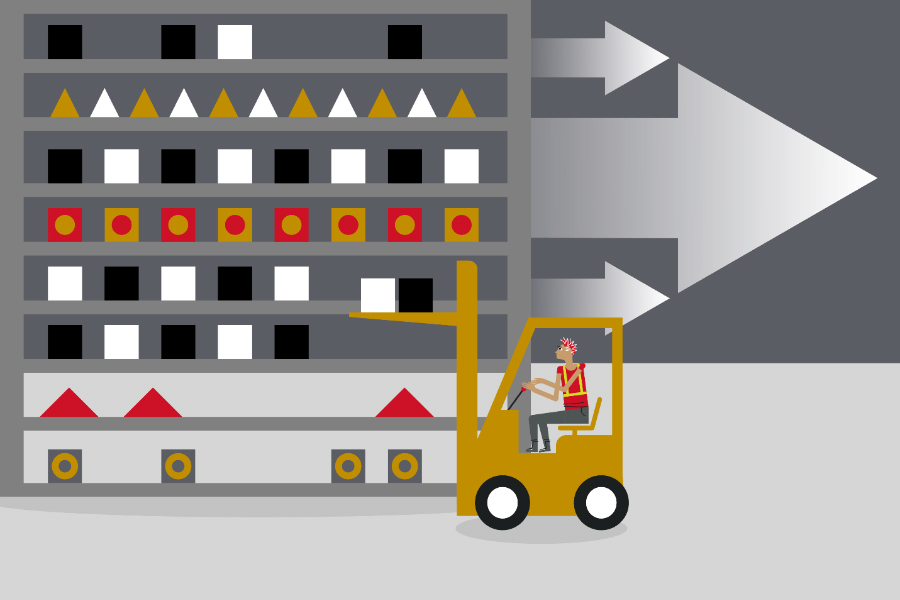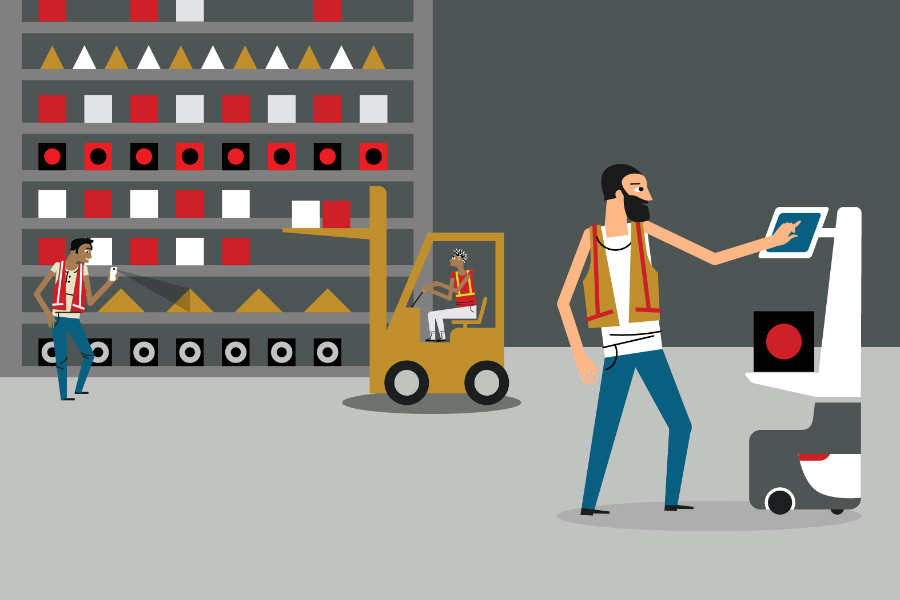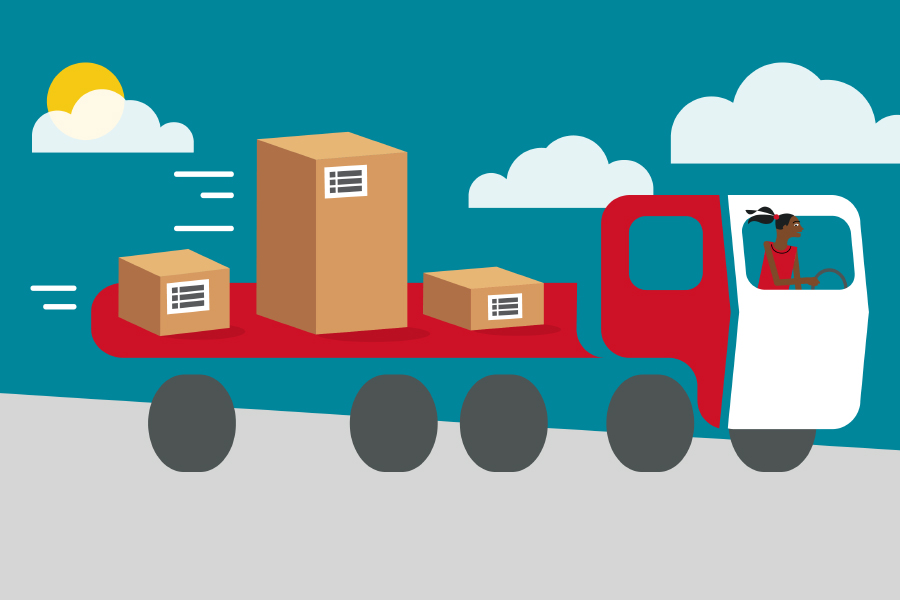[Updated post from March 4, 2021]
For digitally native brands selling direct-to-consumer, thinking about where to store inventory and how to pack orders to reduce shipping costs can become overwhelming.
In the long run, self-fulfillment drains both your time and resources, taking your focus away from core business objectives like growing a loyal customer base. When a brand begins experiencing that struggle between core business functions and fulfilling orders, it may be time to consider outsourcing fulfillment.
In this post, we’re going to cover 7 reasons why merchants should be outsourcing e-commerce order fulfillment to an experienced fulfillment provider:
What is e-commerce fulfillment?
E-commerce fulfillment refers to the end-to-end fulfillment process coordinated by an online store or third-party logistics partner to deliver orders to the end customer. This includes:
- Receiving and storing inventory
- Order processing
- Picking/Packing orders
- Shipping & delivery
- Return management
When e-commerce is supposed to be a byword for convenience and speed, getting your fulfillment process right from the outset is critical.
By outsourcing order fulfillment to an experienced fulfillment partner, e-commerce brands can achieve more streamlined, cost-effective fulfillment that gives you a competitive advantage. Let's take a look at why outsourcing fulfillment is beneficial for your business:
1. Achieve more cost-effective order fulfillment
When e-commerce businesses are just starting out, self-fulfillment is the most logical strategy. In scenarios where order volumes are low and budgets are tight, keeping fulfillment in-house is usually more cost-effective than outsourcing e-commerce order fulfillment to a third-party logistics company.
But as an e-commerce store becomes established and order volumes increase, choosing to fulfill in-house takes up valuable time and resources – to the point that you can no longer save money by doing so.
Why? Because the larger your order in-house fulfillment process becomes, the more your running costs will grow. Having complete control over fulfillment means that the cost of warehouse space, utilities, insurance, labor (payroll, training, and recruiting), and packaging materials add up - not to mention the extensive amount of administration this takes to coordinate.
By outsourcing fulfillment to a third-party logistics provider (3PL), e-commerce businesses are deferring these fulfillment costs to a company with the economy of scale to split expenses between multiple clients. This means bigger cost savings – especially as your business scales:
“Rad Power Bikes has seen massive growth every year since the company was founded, and as demand and interest for ebikes has surged, we needed the ability to scale quickly. With a Seattle presence and a nationwide operation, Ryder was a clear choice for a fulfillment partner that allows us to deliver an unrivaled customer experience.” Mike McBreen, Chief Operating Officer at Rad Power Bikes.
2. Avoid the complexities of warehouse management
SKUs need a place to be stored securely until they are routed to fulfillment centers, ready to be picked and packed for online orders. This is why inventory storage is an integral part of the supply chain – and one of the biggest logistical puzzles.
Knowing how much storage space you need during both peak and off-peak seasons for multiple sales channels, how to facilitate effective pick/pack strategies for SKUs, and where your fulfillment centers should be located requires both expertise and the assistance of advanced fulfillment automation, something that a regular storage facility doesn't offer.
Outsourcing order fulfillment services to an experienced e-commerce fulfillment partner mitigates these challenges because they have both the physical and technological infrastructure to offer streamlined fulfillment solutions. Most third-party logistics companies will offer their customers the use of their Warehouse Management System (WMS) and Order Management System (OMS), which gives you the additional advantage of superior inventory management and real-time visibility.
3. Improved shipping rates and speeds
Shipping costs are one of the biggest deal-breakers in e-commerce, for both shoppers and merchants. Consumers want e-commerce shipping and delivery to be fast and cheap, while merchants need to protect their margins to avoid making a loss.
With over 70% of shoppers deciding their preference for shipping orders before they even reach the checkout, customer satisfaction in e-commerce increasingly hinges on the efficiency of the entire fulfillment process.
But offering fast and free shipping simply isn’t feasible for many e-commerce business owners to achieve independently, especially if they lack a multi-node fulfillment strategy that uses multiple fulfillment centers close to their end customers. Moreover, lower shipping volumes mean that most online retailers do not have access to wholesale discounts with major parcel carriers to keep costs down.
By outsourcing e-commerce order fulfillment, merchants will gain access to more affordable shipping rates due to 3PLs’ ability to negotiate volume-based discounts with major carriers. Furthermore, partnering with an e-commerce fulfillment provider with multiple warehouses offers the flexibility and choice to store goods much closer to your customer, which reduces both shipping costs and last-mile delivery timeframes.
“Faster turnaround has enabled us to scale up how many orders we can ship per day. Our biggest day so far with Ryder saw us ship between 19,000 to 20,000 orders during our January sample sale—a volume that would have taken around 14 days with our old 3PL. Despite the complexity of the implementation, the results were totally worth it.” Jon-Mark Craddock, Director of Logistics at Tuckernuck.
4. Increased business reach
Thanks to minimal overheads and low barriers to selling, direct-to-consumer (D2C) brands can scale rapidly when market conditions are right. However, a growing e-commerce business may not have the means to continue managing the order fulfillment process and shipping to their growing customer base independently.
A sudden surge in order volumes may result in the need to ship more frequently to more distant U.S. states, or even internationally. This adds major logistical challenges thanks to extensive shipping regulations, service levels, and possibly handling different currencies. If an e-commerce business doesn't feel that it's able to adequately scale with demand, they end up forgoing significant growth opportunities.
Outsourcing e-commerce fulfillment allows a business to scale faster, service more customers at a distance, and improve delivery efficiency, giving merchants a strong competitive advantage in a dynamic retail marketplace.
“When the pandemic took hold back in March-April 2020, we were faced with our online order volumes surging beyond what we would normally handle even during peak season. Ryder was able to scale up fulfillment activities at our West Coast location ten-fold within just two weeks, and then scale down just as efficiently when normal patterns resumed in May. Their capacity to meet our newfound needs so quickly has made them an invaluable partner during such a challenging time.” Robert Hedwall, Manager of Supply Chain and Logistics at SodaStream.
5. Reduced opportunity costs
The more time your business spends managing fulfillment and shipping, the less time there is for you to focus on new ways to promote your brand and boost sales.
Ultimately, this lack of bandwidth can result in your brand stagnating and struggling to attract new customers. Without the right support and resources, an e-commerce business can't scale effectively and maximize growth opportunities.
Outsourcing order fulfillment helps to minimize those lengthy administrative tasks associated with fulfillment and logistics, ensuring that you don't miss out on valuable opportunities to keep your brand moving.
6. Track orders and inventory with ease
Ecommerce order fulfillment involves a lot of moving parts and staying in the loop when orders are always flowing in can be a challenge. A lack of visibility into your operation increases the likelihood of errors happening due to outdated information, which slows down fulfillment processes considerably.
One of the biggest benefits of outsourcing fulfillment is that modern fulfillment providers aren't just managing operations; they're also supplying the technology that makes e-commerce fulfillment run efficiently.
A technology-led fulfillment provider will supply fulfillment software that integrates directly with your e-commerce store and existing management systems. Seamless integrations with key platforms such as Shopify mean that your e-commerce fulfillment provider can receive notifications and order status updates in real-time, creating a much more nimble fulfillment strategy that can identify and respond to issues at short notice.
“We love the simplicity of the Ryder e-commerce platform, and how easy it’s been to train our staff on it for better insight into our operation. We’ve also been impressed with how Ryder has looked to the long-term, mitigating issues with scaling and preparing for the new normal following the pandemic.” Mary-Chelsea Banister, Senior Manager at Free Fly Apparel.
7. Better customer experiences
Delivery delays and errors during order fulfillment negatively impact the customer experience (CX) and can be highly damaging to your brand – especially when CX is now the biggest brand differentiator in e-commerce.
Today's online shoppers want to be wowed by unique experiences that make them feel valued – and outsourcing order fulfillment enhances your ability to deliver these experiences.
Fulfillment providers who can integrate value-added fulfillment services, such as custom packaging and kitting services, directly into the fulfillment process enable you to offer far more memorable and personalized brand experiences to your customers:
“When we started to look seriously at scaling our e-commerce fulfillment operation with Ryder, it was their embroidery capabilities that won us over. The ability, experience, and willingness to adapt that Ryder has shown via their value-added services has made them the ideal 3PL for us. We bought in the hardware, while they bought in the operators who we trained. It really is a true partnership.” Steven Feczko, Senior Director of Operations at Hedley & Bennett.
D2C brands are currently experiencing more than their fair share of challenges, especially as competition and expectations for better customer service increase. Deciding to outsource fulfillment is not easy, especially when you're accustomed to having complete control over your fulfillment strategy. But by doing so, you stand to gain access to better cost savings - and just as importantly, valuable time back to invest in your business.
Partnering with an experienced e-commerce fulfillment service provider like Ryder offers the ideal fulfillment solution for both emerging and established D2C brands. Our services across e-commerce, retail, and wholesale enable e-commerce businesses to scale and expand their sales channels with the support of a nationwide network of facilities and powerful automation technology. Contact us today to find out how outsourcing fulfillment can turbocharge your business.




